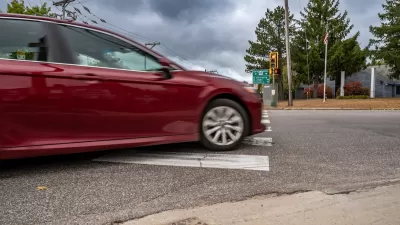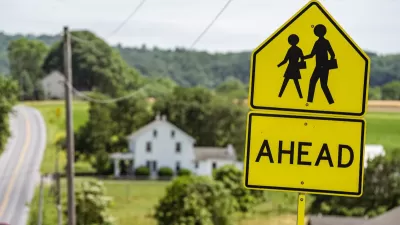The resolution acknowledges the epidemic of traffic fatalities and calls on DOT to focus on traffic safety with the goal of reducing roadway deaths to zero by 2050.

A non-binding bi-cameral resolution introduced by Sen. Richard Blumenthal (D-Conn.) and Rep. Jan Schakowsky (D-Ill.) seeks to address the rising number of traffic fatalities nationwide, according to Streetsblog.
The five-page resolution — which is co-sponsored by five senators and five representatives, all Democrats — puts a belated national focus on a growing public health crisis. According to National Traffic Safety Administration, the number of pedestrian fatalities jumped by 44 percent in the decade between 2010 to 2019, while deaths of cyclists in crashes rose 36 percent in the same period, spurred by the continued dominance of dangerous road designs as well as the the growth in popularity of larger vehicles like SUVs and pickups.
"If passed, the resolution would commit Congress and the U.S. Department of Transportation to work together to achieve zero roadway fatalities by 2050 and calls on the DOT to improve data gathering and implement measures that promote traffic safety." The resolution also acknowledges the importance of language, encouraging "the use of the term 'crash' and not 'accident' when describing traffic incidents," and promotes "efforts to address disparities and other equity-related issues related to transportation safety."
According to Vision Zero Network director Leah Shahum, the resolution represents an important first step. "Our priorities, plans, and policies are based on the goal we aim for, and we should not be aiming for some of our loved ones to be safe as they move about our communities — we should be working for safety for all." And while not all Vision Zero programs have shown success–in New York City, 43 pedestrians were killed in the first four months of 2021 alone–other cities, like Hoboken, managed to eliminate traffic deaths altogether.
FULL STORY: BREAKING: National ‘Vision Zero’ Resolution Introduced

Trump Administration Could Effectively End Housing Voucher Program
Federal officials are eyeing major cuts to the Section 8 program that helps millions of low-income households pay rent.

Planetizen Federal Action Tracker
A weekly monitor of how Trump’s orders and actions are impacting planners and planning in America.

The 120 Year Old Tiny Home Villages That Sheltered San Francisco’s Earthquake Refugees
More than a century ago, San Francisco mobilized to house thousands of residents displaced by the 1906 earthquake. Could their strategy offer a model for the present?

HSR Reaches Key Settlement in Northern California City
The state’s high-speed rail authority reached an agreement with Millbrae, a key city on the train’s proposed route to San Francisco.

Washington State Legislature Passes Parking Reform Bill
A bill that would limit parking requirements for new developments is headed to the governor’s desk.

Missouri Law Would Ban Protections for Housing Voucher Users
A state law seeks to overturn source-of-income discrimination bans passed by several Missouri cities.
Urban Design for Planners 1: Software Tools
This six-course series explores essential urban design concepts using open source software and equips planners with the tools they need to participate fully in the urban design process.
Planning for Universal Design
Learn the tools for implementing Universal Design in planning regulations.
Ada County Highway District
Clanton & Associates, Inc.
Jessamine County Fiscal Court
Institute for Housing and Urban Development Studies (IHS)
City of Grandview
Harvard GSD Executive Education
Toledo-Lucas County Plan Commissions
Salt Lake City
NYU Wagner Graduate School of Public Service





























